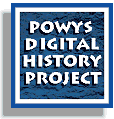
Education in Wales 1
Introduction
The origins of education
During the Middle Ages the vast majority of the population had
no access to any kind of education. Only the sons of the property
owning classes could afford to attend the few schools which did
exist and go on to Oxford or Cambridge, or enter the Church or
the legal profession.
By the sixteenth century the expanding trading classes wanted an education for their sons and a number of grammar schools were set up to meet the new demand, some created like Christ's College, Brecon, by the church, and some, like John Beddoes' school in Presteigne, endowed by successful local businessmen.
The Welsh Trust and SPCK
During the period of the rule
of Parliament following the death of Charles 1, attempts were
made to create a system of education open to a wider section
of society and sixty "free schools" were founded in
Wales. Although little is known about these schools and they
were swept away at the Restoration of the monarchy, they did
demonstrate new possibilities. Thomas Gouge of London established
a fund in 1674 to help set up Welsh language schools across Wales
which taught basic literacy through the Bible and religious texts
according to Anglican principles. He also created the Welsh Trust
to publish books in support of these aims. Some 300 schools were
created in this way.
In 1699 four men including Cardiganshire MP, Sir Humphrey Mackworth, established the Society for the Promotion of Christian Knowledge, which set up a nationwide network of Anglican charity schools across Wales. Teaching was in both English and Welsh and the SPCK published and made widely available a Welsh Bible. As well as basic literacy and the catechism, boys were taught arithmetic and girls needlework, spinning and weaving. Although the schools were set up in a wide variety of buildings, annual inspections kept the standards to a high level.
There are 6 pages on the origins of education in Wales. Use the box links below to view the other pages.